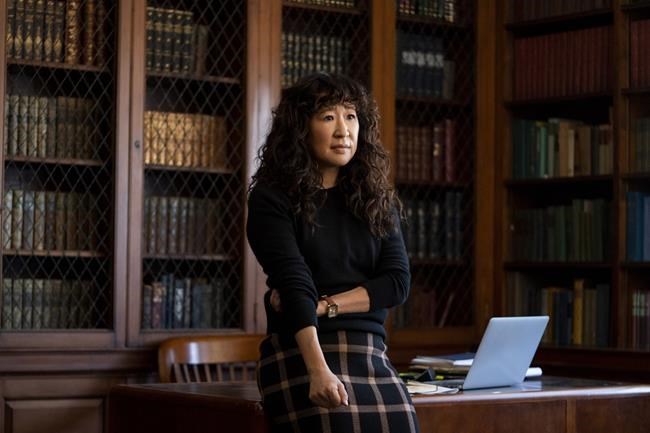
Sandra Oh is shown in an episode of "The Chair" in this undated handout photo. Sandra Oh was hooked on her new Netflix dramedy series "The Chair" the second she saw the name of her character, Dr. Ji-Yoon Kim. The acclaimed Ottawa-raised actor plays the new English department chair at a prestigious university trying to raise its enrollment numbers, diversify its largely white, male staff base and change its systemic racism and sexism issues. THE CANADIAN PRESS/HO - Netflix, Eliza Morse
August 18, 2021 - 1:00 AM
TORONTO - Sandra Oh was hooked on her new Netflix dramedy series "The Chair" the second she saw the name of her character, Dr. Ji-Yoon Kim.
The acclaimed Ottawa-raised actor plays the new English department chair at a prestigious university trying to raise its enrollment numbers, diversify its largely white, male staff base and change its systemic racism and sexism issues.
"I was just so excited when I opened the pilot and the character's name is a Korean name," the Golden Globe Award-winning "Killing Eve" and "Grey's Anatomy" star, who is of Korean heritage, said in a recent video interview from London.
"Those little things in my journey in my career mean a lot. It means a lot that every single character has to say 'Prof. Kim' or calls me 'Ji-Yoon' — that very subtle thing of it being specific to the character and you're not hammering anyone over the head, but it's bringing the audience an understanding: you know people who have names that express their ethnicity, so ... let's familiarize our ear to it."
Debuting Friday, "The Chair" follows Ji-Yoon as she juggles her new position with being a single parent to an adopted Mexican daughter and a support system to a close colleague, played by Jay Duplass, as he grieves the loss of his wife and faces a social media-fueled scandal at the school.
Actor Amanda Peet is executive producer, writer and showrunner on the six, half-hour episodes, shot under COVID-19 protocols in Pittsburgh earlier this year. While filming there in March, Oh gave a powerful speech at a Stop Asian Hate protest in the wake of a rise in anti-Asian hate incidents in the United States.
Oh said she felt it was important to establish the reality and specificity of Ji-Yoon's experience, from speaking Korean to her father, to trying to connect her ethnicity with that of her Latinx daughter.
"That's how change happens in a very subtle way," said Oh, citing South Korean "Parasite" director Bong Joon Ho's Golden Globe-winning speech, in which he said: "Once you overcome the one-inch-tall barrier of subtitles, you will be introduced to so many more amazing films."
"The universality hopefully spreads out from there. We're not saying one thing or another. You're just seeing someone in their life trying to get through their day. But then what happens is that you say a lot, as in there are times where you're trying to relate to your child and it's not working. And then with your parent and your child, there's a language barrier and surprises along the way. Also the expression of being a single mom and a single working mom, that's all in there just by seeing Prof. Kim trying to get through her day."
Ji-Yoon faces immense pressure as the first woman and first woman of colour to chair the department and take on a chaotic system that seems almost impossible to fix.
In the trailer she says she feels the school handed her a "ticking time bomb because they wanted to make sure a woman was holding it when it explodes."
As Ji-Yoon finds herself caught between an older generation of professors who don't want to leave and the students demanding change, the story explores the nuances and doesn't blame one side, said Oh.
The story has parallels with the reckoning happening in industries including Hollywood, where Oh has also broken barriers, becoming the first Asian woman to be nominated for an Emmy for lead actress in a drama series for "Killing Eve."
The takeaway, at least from "The Chair," is that "change is very slow" in such situations, said Oh.
"When you're trying to move things within a very established system, in some ways the only thing that you have control over is your own personal relationships," said Oh, whose upcoming projects include the Toronto-set Disney and Pixar animated film "Turning Red" by Canadian Oscar-winning director Domee Shi.
"Prof. Kim decides to make certain choices at the very end of the series that has to do with keeping her relationships intact and forgoing certain positions. So I feel quite close to that, because institutions are bigger than the individual, and to keep railing against that or putting yourself up as failure if you can't change it one way or another is the wrong way to take a look at it."
This report by The Canadian Press was first published August 18, 2021.
News from © The Canadian Press, 2021